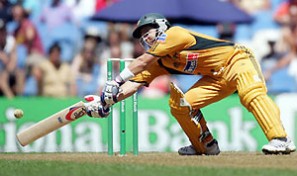MUST WATCH: JFM obliterates IPL bowling attack - even Bumrah! - for 15-ball 50... and keeps going
A six-laden, 27-ball 84 from Jake Fraser-McGurk to continue his outrageous debut IPL!

There was a generation of stars that Australian cricket missed out on. There is no doubt that the Australian cricket team through the Taylor, Waugh and Ponting years was perhaps the greatest the world has ever seen.
It is highly unlikely its like will ever be seen again.
However, the years from 2008 to the present have been less than satisfactory for a team so long unchallenged as the best in the world.
Of a total of 71 Tests in this period, Australia have won 33, a winning ratio of 46%.
Of the 46 matches played against the other powerhouse nations, England, India and South Africa, Australia have won only 13, or 27%.
While this numbers are not abysmal, they are unsatisfactory for a team that had dominated world cricket for so long.
This leaves the question – why then, was the team not able to adapt to the retirements in and around those years, as it had before over its long period of success?
While previously the retirements of the players leaving the team were staggered, whether intentionally or not, it allowed for a large sense of continuity within the team.
There was no more than one or two new players in the team at any given time.
This is in stark contrast to the mass exodus the team saw from the end of the ’06-’07 Ashes to early 2009.
In two years the team had become almost unrecognisable with Michael Hussey, Ponting and Michael Clarke the only familiar faces.
All time greats like Matt Hayden, Justin Langer, Adam Gilchrist, Shane Warne, Glenn McGrath all retired.
Similarly, the of losses Brett Lee, Andrew Symonds, Jason Gillespie and others around this time were also a harsh blow on the once solid team.
This led to selectors being unable to slowly integrate one or two new players to the team at a time and led to the debuts of players some would classify as not Test level.
It also helped potentially create a generation of cricketers who either entirely missed out on selection, or had their international chances limited as the selectors looked to more youthful players to make up the long term future of the team, perhaps looking for another group of players who could play 100 Tests.
Many of the players who suffered from this would have had the skill and ability to have distinguished Test careers in any other era, or any other team. Here are a few:
• David Hussey (13, 499 runs at 51.72, 43 Hundreds)
In an article on the 15th of November, The Roar’s very own Ronan O’Connell wrote a brilliant article which asked if Hussey was the most unlucky player of the modern era.
I would agree wholeheartedly that yes indeed he is. To consider that Glenn Maxwell was chosen to play for the Test team as a batsmen who can bowl some off breaks just adds insult to the whole saga.
Given that at 36-years-old, there is essentially zero chance Hussey will ever earn a coveted baggy green, I agree with those pundits who suggest he will go down as the best player never to play a Test.
• Brad Hodge (17, 084 runs at 48.81, 51 Hundreds)
When you consider that Hodge was dropped two Tests after a double century and has a Test average of nearly 56, I think it is safe to assume that he was more than comfortable making the leap to Test level.
This makes it all the more difficult to stomach that he did not have an extended Test career. His return to Test level in 2008 should have been the beginning of a five-year Test career.
• Chris Rogers (20,886 runs at 49.72, 63 Hundreds)
Yes, he has finally made a return to Test cricket, but there would be no punters out there willing to bet he would be spending more than 15 Tests back in the team, which is tragic for a man with his record.
Similarly Marcus North, Cameron White, Rob Quiney, Michael Klinger, Chris Hartley even Ryan Harris deserve to be included in this list of players whose international, or potential international, careers were hampered by this rapid retirement of greats.
Make no mistake, this is not a criticism of the players for retiring when they did, nor is it suggesting that the likes of Warne, Gilchrist, Langer etc., should have retired earlier to allow for a more gradual change in the team.
Merely it is just an observation of what occurred and those who were misfortunate to suffer because of it.
We have just won back the Ashes, and have an opportunity for a 5-0 whitewash, so while not wanting to take away from that, it does not erase five years of mediocracy.
I would wager Dale Steyn, Hashim Amla, A.B. De Villiers and friends will be eager to prove wrong those who say an Ashes series is the toughest Test in world cricket.